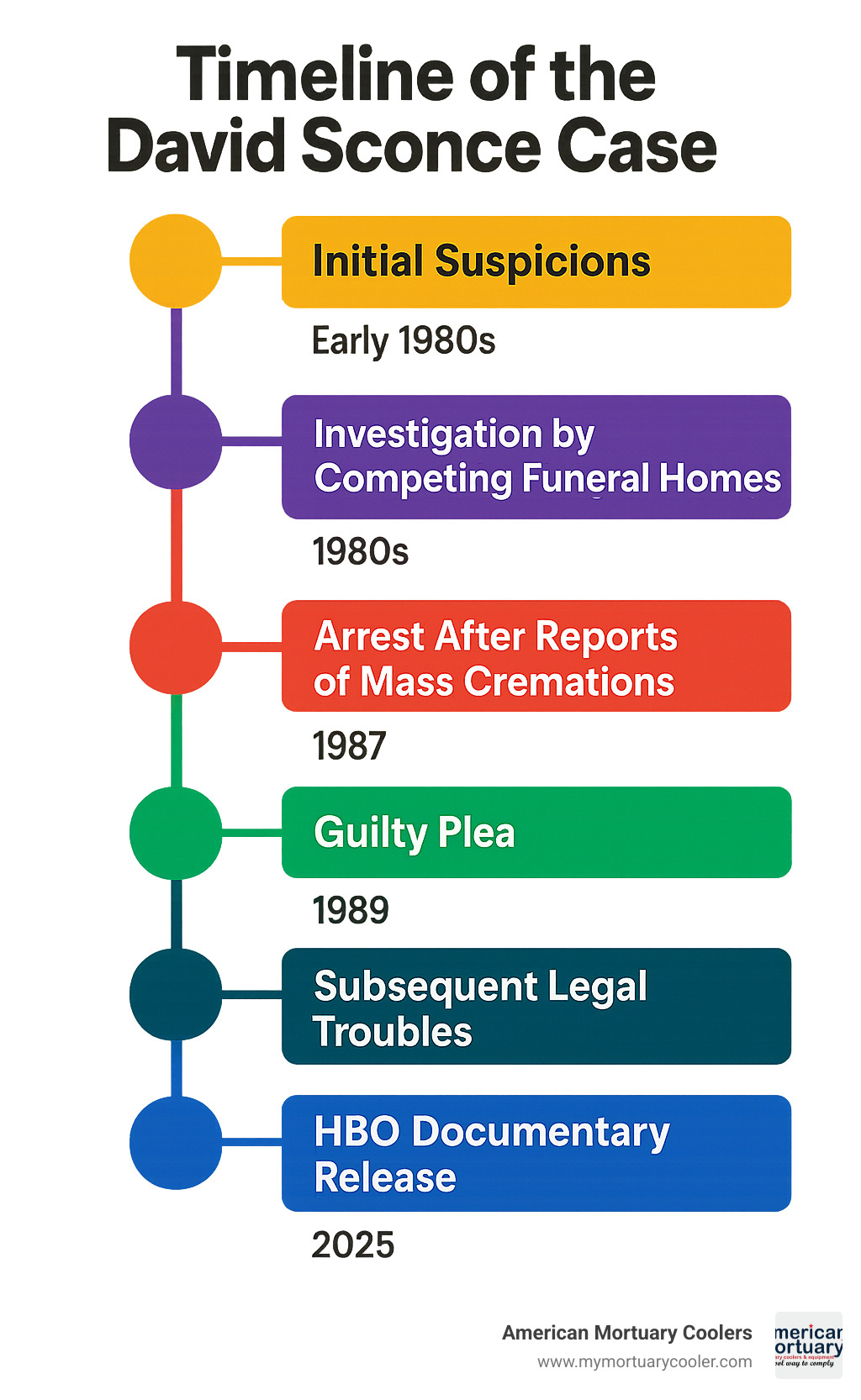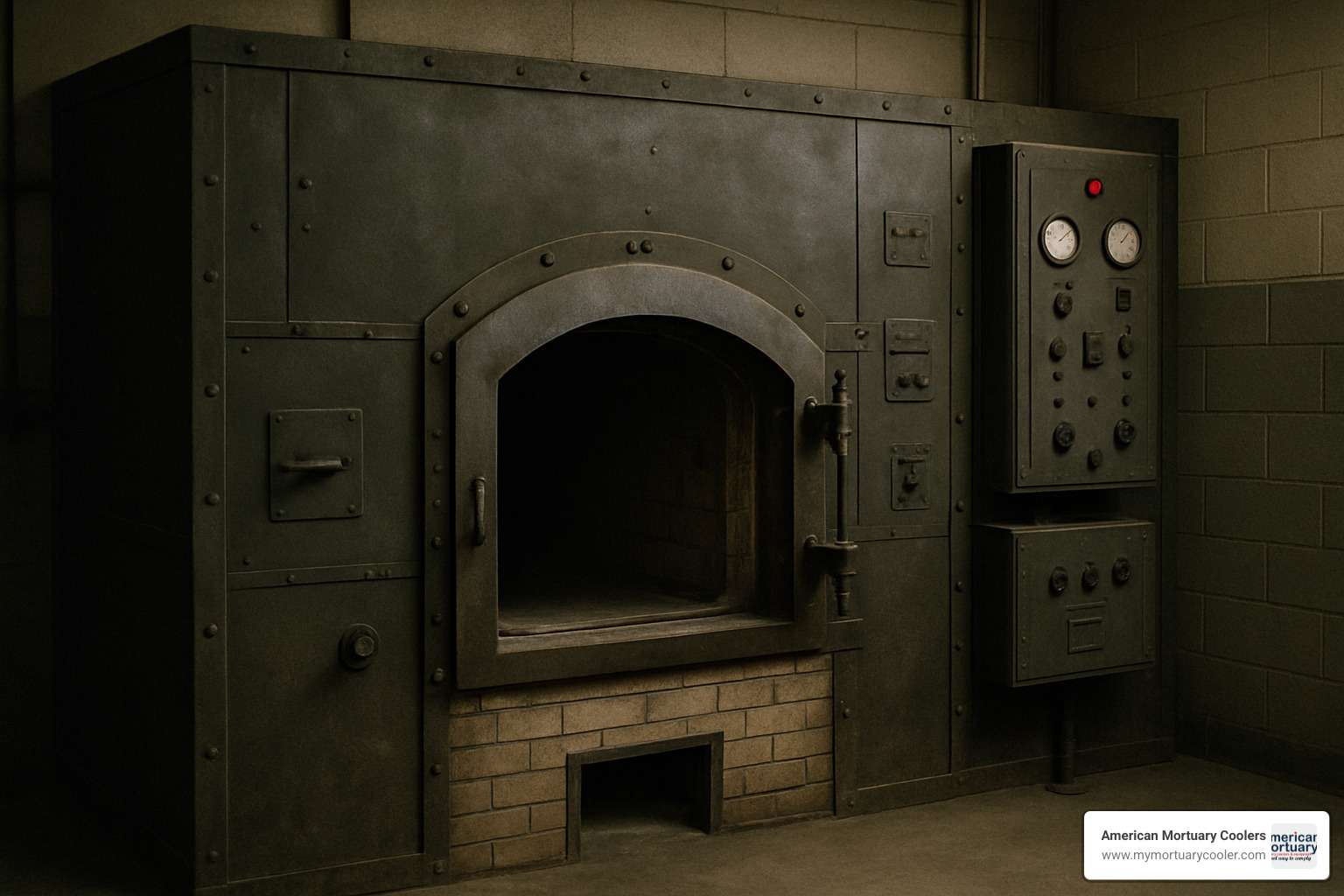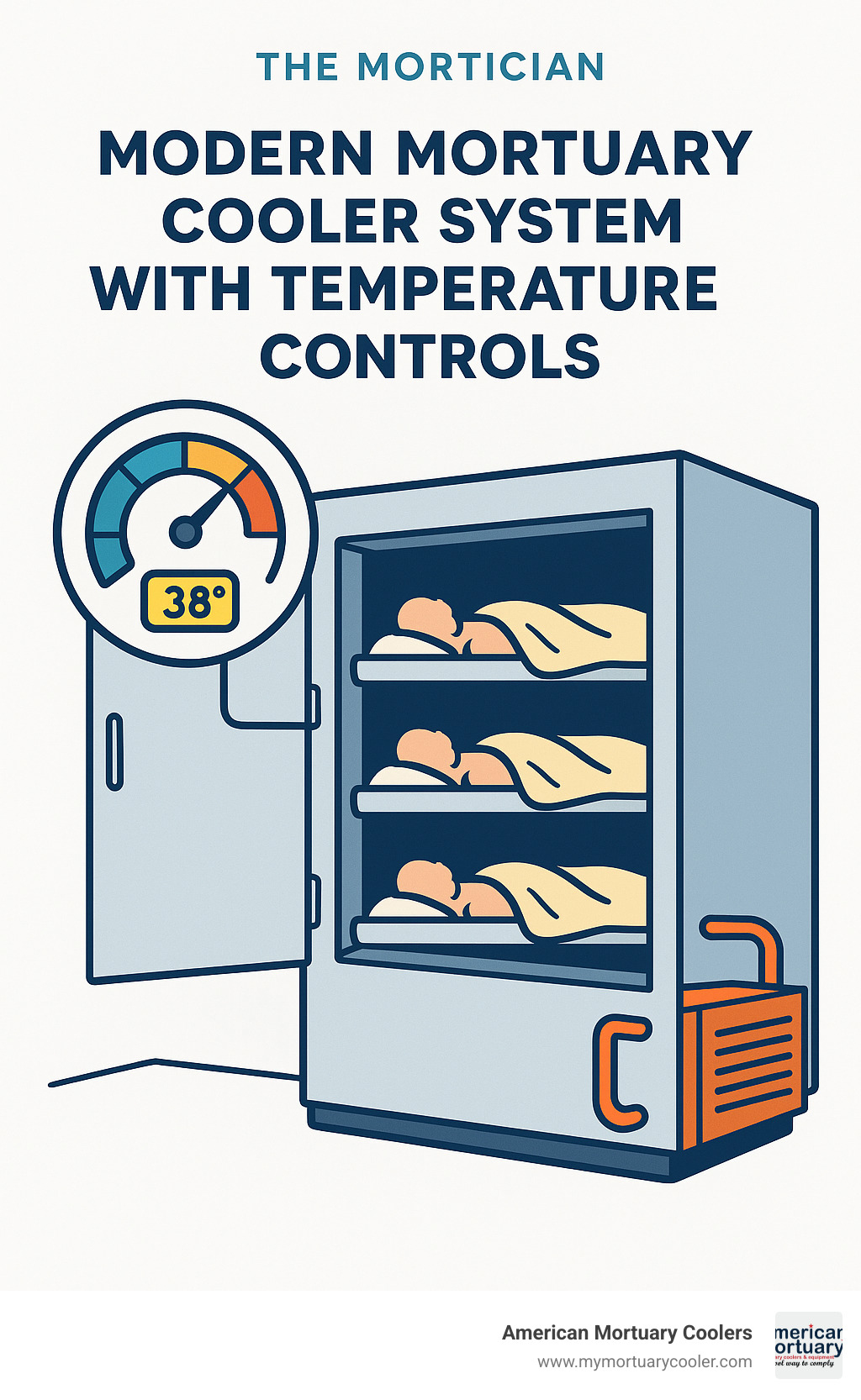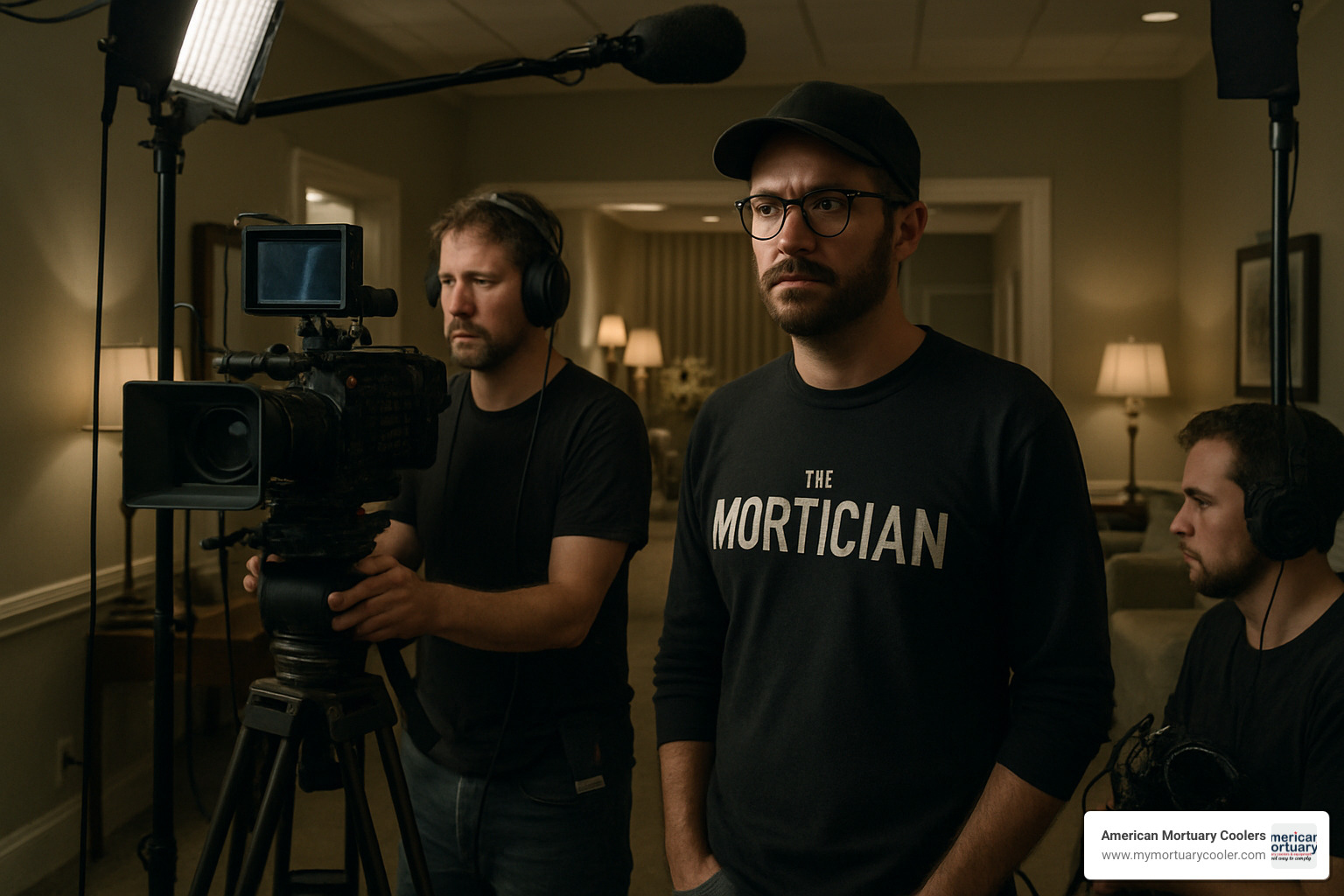The True Story Behind HBO's Shocking Documentary Series
The Mortician is a three-part HBO documentary series premiering June 1, 2025, that chronicles the disturbing true story of David Sconce and the infamous Lamb Funeral Home in 1980s Pasadena, California. For those searching for quick information:
| The Mortician | Key Details |
|---|---|
| Format | Three-part documentary series |
| Release Date | June 1, 2025 |
| Platform | HBO/Max |
| Director | Joshua Rofé |
| Executive Producer | Jonah Hill (Strong Baby) |
| Subject | David Sconce's criminal operation at Lamb Funeral Home |
| Crimes | Mass cremations (150-200 bodies at once), stealing dental gold, mutilating corpses, hiring hitmen |
| Sentence | 5 years in prison (1989 plea deal) |
| Industry Impact | Led to new laws requiring unannounced crematory inspections and making dental gold theft a felony |
This darkly gripping documentary exposes how a family-run mortuary engaged in morally questionable and inhumane practices to maximize profits in the multibillion-dollar funeral industry. The series features exclusive interviews with David Sconce (newly released from prison), victims' families, former employees, and journalists who covered the case.
The revelations in The Mortician are particularly disturbing because they violated the sacred trust between funeral homes and grieving families. When someone loses a loved one, they place immense faith in funeral professionals to handle remains with dignity and respect. What happened at Lamb Funeral Home represents a profound breach of that trust.
"In the funeral industry, it's pretty damn gruesome," notes director Joshua Rofé, explaining that the documentary doesn't shy away from the horrific details while remaining sensitive to victims.
I'm with American Mortuary Coolers, a national-level supplier of mortuary refrigeration systems with experience in the funeral industry. Having worked with countless ethical funeral homes seeking proper equipment for dignified remains preservation, we've seen how professional standards and proper equipment are crucial safeguards against the kind of abuses documented in The Mortician.

What Is The Mortician Docuseries About?
The Mortician takes viewers on a disturbing journey into one of the funeral industry's most shocking scandals. At its heart, this docuseries reveals how David Sconce transformed his family's once-respected Lamb Funeral Home in Pasadena into a criminal enterprise that shocked California in the 1980s.
Director Joshua Rofé, known for tackling difficult subjects with unflinching honesty, spent years carefully gathering material for this three-part HBO series. The project gained significant momentum when Jonah Hill joined as executive producer through his Strong Baby production company, bringing additional resources and star power to this dark true-crime exploration.
The Mortician – Central Premise & Structure
The documentary unfolds as a three-part series, with each hour-long episode building upon the last. The story progresses chronologically, beginning with Sconce taking over the family business and implementing what started as cost-cutting measures but quickly spiraled into criminal activity that would shake the funeral industry to its core.
What makes The Mortician so compelling is the rare access to Sconce himself. Recently released from prison when filming began, he sits for extensive on-camera interviews where he discusses—and sometimes eerily defends—his actions. This first-person perspective gives viewers a chilling glimpse into the mindset behind these disturbing crimes.
Starting June 1, 2025, all three episodes will be available simultaneously on HBO and HBO Max, allowing subscribers to digest this complex case at their own pace.
Key People on Camera
The docuseries weaves together perspectives from those directly involved in and affected by the scandal. David Sconce himself provides the most unsettling testimony, showing little remorse when he coldly states, "There's no difference in anybody's cremated ash...people just got to be more in control of their emotions."
The Mortician also features heartbreaking interviews with victims' families who received misidentified or commingled ashes. Their emotional accounts reveal the lasting trauma of finding their loved ones' remains were mishandled. Former Lamb Funeral Home employees share insider perspectives on the operation, describing the disturbing processes and the relentless pressure to maximize profits at all costs.
Journalists who broke the original story explain their investigation process and the obstacles they faced bringing this scandal to light. Adding important context, competing funeral directors from the Pasadena area describe how they first became suspicious of Sconce's unusually high volume and suspiciously low prices, highlighting just how dramatically he deviated from industry standards.
This rich mix of voices creates a multidimensional narrative that examines not just the crimes themselves, but the profound ripple effects they had throughout the community and the funeral industry as a whole. The series serves as both a true-crime documentary and a cautionary tale about what can happen when profit is prioritized over dignity in death care.
David Sconce, Lamb Funeral Home & the Crimes That Shocked California

When you trust a funeral home with your loved one's remains, you expect dignity, respect, and care. What happened at Lamb Funeral Home in Pasadena during the 1980s violated that sacred trust in ways that still send shivers through the funeral industry today.
The story of David Sconce and Lamb Funeral Home isn't just disturbing—it fundamentally changed how we regulate death care in America. As a company that works with ethical funeral homes daily, providing proper equipment for dignified remains preservation, we find this case particularly troubling.
The Mortician Episode Focusing on Sconce's Tactics
The second episode of The Mortician pulls back the curtain on Sconce's operation with stomach-turning detail. What began as cost-cutting quickly spiraled into something far more sinister.
Instead of performing individual cremations as families expected, Sconce crammed 150-200 bodies at once into ovens designed for single remains. To fit more bodies, staff would break bones or dismember corpses—even holding macabre competitions to see who could pack the most bodies per cremation cycle.
"We were just trying to be efficient," Sconce explains in one chilling interview, showing remarkably little remorse decades later.
Perhaps most disturbing was the systematic theft of dental gold. Former employees describe how Sconce would extract gold fillings before cremation—sometimes in his garage with nothing more than a hammer and pliers. This dental gold became a significant revenue stream for the operation, all stolen from the dead without family knowledge or consent.
The documentary reveals a particularly heartbreaking moment when a Holocaust survivor living near Sconce's desert crematory called authorities after recognizing an odor he hadn't smelled since Auschwitz—the smell of mass human cremation. This call became a crucial turning point in the investigation.
When rival funeral directors grew suspicious and threatened exposure, Sconce allegedly tried to have them killed, adding attempted murder to his growing list of crimes. In 1989, he finally pleaded guilty to charges related to mishandling human remains and received a five-year prison sentence.
| Legal Cremation Practice | Sconce's Illegal Practice |
|---|---|
| One body per cremation | 150-200 bodies simultaneously |
| Complete separation of ashes | Commingled ashes returned to families |
| Dental gold remains with body | Systematic extraction of dental gold |
| Proper identification protocols | Misidentified remains |
| Respectful handling of remains | Dismemberment to fit more bodies in ovens |
Impact on Families & Community
"I thought I was scattering my father's ashes at his favorite fishing spot," one woman explains through tears in The Mortician. "Now I don't know whose remains those were—or how many people were mixed in with him."
This sentiment echoes throughout the documentary as dozens of families grapple with a unique form of trauma. Many had already processed their grief, only to have wounds reopened when they learned the truth. Some had kept urns on mantlepieces for years or even incorporated ashes into memorial jewelry—all potentially containing dozens or hundreds of strangers' remains.
The Pasadena community's collective trust was shattered. Local funeral directors describe in the documentary how they spent years rebuilding public confidence, implementing transparent practices, and opening their facilities to public inspection to distance themselves from Sconce's operation.
The legal system struggled to address such an unusual crime. While lawsuits followed, many families expressed that no financial settlement could heal the emotional damage. How do you compensate someone for the desecration of a loved one's remains? What do you do with commingled ashes once you know the truth?
At American Mortuary Coolers, we've seen how proper equipment and ethical standards form the foundation of dignified death care. The Sconce case underscores why we're passionate about providing funeral homes with the right tools to maintain integrity in their operations—because families deserve better than what happened at Lamb Funeral Home.
Industry Fallout: Regulations, Ethics & Modern Safeguards
The Sconce scandal ripped open the curtain on a disturbing lack of oversight in the funeral industry, leading to sweeping changes that continue to protect families today. The Mortician shows us this case wasn't just shocking news—it became the catalyst for meaningful reform.
As a company that works with funeral homes across America providing essential refrigeration equipment, we've seen how proper tools and protocols create a foundation for ethical care. At American Mortuary Coolers, we partner with funeral directors who are committed to maintaining dignity in death care—the exact opposite of what happened at Lamb Funeral Home.
How The Mortician Changed Funeral Laws
California lawmakers responded quickly once the full horror of Sconce's operation came to light. No longer would the industry operate on an honor system. Instead, crematoriums now face surprise inspections that can happen any day, without warning. This keeps even the most profit-minded operators honest.
Taking dental gold from the deceased—a practice Sconce turned into a side business—became a felony offense rather than a mere slap on the wrist. New paperwork requirements created a verifiable trail for every body from the moment it enters a funeral home until final disposition.
"The Sconce case fundamentally changed how we approach oversight," explains one California funeral board official interviewed in The Mortician. "We realized good intentions weren't enough—we needed verification."
The ripple effects spread well beyond California's borders. As news of the scandal reached other states, many regulatory bodies took a hard look at their own rules. The National Funeral Directors Association strengthened its Code of Professional Conduct, putting ethical handling of remains front and center.
Ethical Best Practices Today
Today's funeral profession bears little resemblance to the wild west environment that allowed Sconce to operate. Modern crematory protocols strictly enforce one-body-per-cremation standards, with verification procedures that leave nothing to chance.
Proper refrigeration systems have become non-negotiable. At American Mortuary Coolers, we craft custom mortuary coolers that ensure remains can be properly preserved without rushing the process. This removes the time pressure that Sconce used to justify his mass cremations.
Documentation has evolved dramatically too. Each body now has a paper trail that follows it throughout the entire process, making it nearly impossible to lose track of someone's loved one.
The Mortician raises important questions about the balance between profit and care—a tension that still exists in the funeral industry. But unlike the 1980s, today's funeral homes operate with much greater transparency. Ethical providers offer clear, itemized pricing that helps families understand exactly what they're paying for.

Equipment maintenance has also become a priority. Our mortuary coolers, built in Tennessee and delivered nationwide, represent an investment in proper care—something ethical funeral directors recognize as essential to their mission, not an optional expense.
The profession has come a long way since the days of David Sconce, though vigilance remains important. As The Mortician reminds us, when profit becomes the only consideration, humanity suffers. That's why we're proud to support funeral homes committed to doing things right.
For more information about proper refrigeration in ethical funeral care, you can explore our resources on mortuary coolers and mortician salaries.
Behind the Camera: Tone, Style & How The Mortician Stands Out

When you settle in to watch The Mortician, you'll immediately notice something different about this documentary. Director Joshua Rofé has crafted a viewing experience that respects both the gravity of the subject matter and the intelligence of the audience. Rather than relying on shock value, Rofé lets the natural horror of the events unfold through powerful testimony and thoughtful storytelling.
The Mortician vs. Other Mortuary Documentaries
What makes The Mortician stand out in the crowded true crime landscape? For starters, the documentary secured something truly remarkable – extensive on-camera interviews with David Sconce himself. Hearing directly from the man behind these disturbing crimes creates an unsettling but invaluable window into how someone could justify such actions to themselves.
"We wanted to understand not just what happened, but how someone could cross these fundamental ethical lines," explains Rofé in press materials for the series. "Sconce's willingness to speak so candidly on camera, often without apparent remorse, adds a psychological dimension that's rare in documentaries of this kind."
The pacing also feels refreshingly deliberate. Where many true crime series race toward the most shocking revelations, The Mortician takes time to establish the sacred trust placed in funeral professionals before revealing how that trust was violated. This approach helps viewers understand the profound breach that Sconce's actions represented.
The documentary employs subtle, tasteful reenactments that illustrate certain aspects of the case without exploiting the victims. These scenes are filmed with a cinematic quality that conveys the seriousness of the situation without resorting to graphic imagery – a balance that's difficult to achieve in true crime storytelling.
Perhaps most importantly, The Mortician centers the experiences of the victims' families. Their emotional testimonies about finding the truth and coping with a second wave of grief provide the heart of the documentary. In one particularly moving sequence, the documentary juxtaposes Sconce's callous statement that "there's no difference in anybody's cremated ash" with the profound testimony of a widow who had kept her husband's supposed remains beside her bed for years before learning the devastating truth.
For those interested in hearing directly from Sconce before watching the full series, HBO has released a brief interview clip that offers a disturbing glimpse into his mindset.
Role of Executive Producer Jonah Hill
You might be surprised to see Jonah Hill's name attached to this project, but his involvement as executive producer through his Strong Baby production company has significantly shaped The Mortician. While Hill doesn't appear on camera, his influence is evident throughout the production.
Hill's creative guidance has helped the documentary achieve a delicate balance – exposing industry abuses while remaining respectful to victims. "We wanted to make something that mattered," Hill noted in pre-release interviews, "something that could potentially prevent future abuses by shining a light on how things went so wrong."
The Strong Baby production banner brought valuable resources to the project, resulting in higher production values than many documentaries in this space. The carefully constructed reenactments, extensive archival research, and polished editing all bear the hallmarks of Hill's commitment to quality storytelling.
Hill's name recognition also helped secure a prime release slot on HBO and expanded the potential audience beyond typical true crime enthusiasts. This wider reach means more people will learn about the importance of proper funeral industry oversight – something we at American Mortuary Coolers consider essential to maintaining dignity in death care.
While The Mortician doesn't shy away from the disturbing details of the Sconce case, it consistently reminds viewers that these actions represent extreme outliers in the funeral profession. Interviews with ethical funeral directors help explain proper standards and the safeguards that have been implemented since the Sconce scandal to protect families during their most vulnerable moments.
Protect Yourself: Choosing a Trustworthy Funeral Home
After watching The Mortician, many viewers find themselves wondering how to avoid becoming victims of funeral home malpractice. While Sconce's operation represents an extreme outlier in the industry, the documentary serves as a powerful reminder that consumer vigilance matters.
At American Mortuary Coolers, we've spent years working with funeral homes across America, from busy New York facilities to family-owned operations in Dallas and Los Angeles. Through these relationships, we've learned what truly sets ethical providers apart from the rest.
Warning Signs & Checklist
When choosing a funeral home, proper licensing should be your first checkpoint—ethical funeral directors display their credentials prominently and take pride in their professional certifications. When you visit, notice whether staff members seem comfortable discussing their qualifications and training.
Transparency about costs is non-negotiable. A trustworthy funeral director will provide a detailed price list without hesitation—it's actually required by the FTC's Funeral Rule. Be wary of anyone offering dramatically lower prices without clear explanations of service limitations. As we saw in The Mortician, Sconce's unusually low cremation prices were a red flag that competitors recognized but families missed.
The facility itself tells a story. Clean, well-maintained spaces reflect professional standards that likely extend to areas you don't see. A good funeral director will offer a tour of public areas and explain their behind-the-scenes processes, even if you choose not to see preparation rooms. Proper refrigeration equipment—something we take very seriously at American Mortuary Coolers—is essential for dignified care.
Perhaps most importantly after watching The Mortician, ask about identification protocols. How does the funeral home ensure your loved one remains properly identified throughout their care? Multiple identification methods, clear documentation, and the option for family witnessing of cremation are hallmarks of ethical practice.
Finally, consider the funeral home's community standing. Established businesses with positive reviews have reputations worth protecting. The National Funeral Directors Association provides a helpful tool on RememberingALife.com to find NFDA members committed to ethical standards.
The Mortician Takeaway for Consumers
The Mortician teaches us that making arrangements while actively grieving can leave us vulnerable. Advance planning gives you time to research options without emotional pressure. The worst time to shop for a funeral is when you need one immediately.
Don't hesitate to ask specific questions about procedures and equipment. Reputable funeral homes invest in proper tools for dignified care—from specialized mortuary coolers to appropriate preparation facilities. An ethical provider will appreciate your diligence rather than discourage questions.
Know your legal rights as a consumer. The FTC Funeral Rule provides specific protections, including your right to use a casket purchased elsewhere and to receive itemized pricing. These regulations emerged partly in response to cases like Sconce's, where consumer vulnerability was exploited.
Most importantly, trust your instincts. If something feels wrong during your initial consultation, it probably is. Ethical funeral directors welcome questions and provide clear, compassionate answers without making you feel rushed or foolish for asking.
For families wanting to better understand standard practices, our guide to the embalming process explains typical procedures in straightforward language. Knowledge truly is protection when making funeral arrangements.
The funeral profession is built on sacred trust. While The Mortician shows what happens when that trust is betrayed, the vast majority of funeral professionals view their work as a calling centered on compassionate care during life's most difficult moments.
Frequently Asked Questions about The Mortician
Is The Mortician Representative of the Entire Funeral Profession?
Absolutely not. The Mortician documents what can only be described as a shocking outlier in the funeral industry. The documentary itself takes care to emphasize this point—David Sconce's operation was the extreme exception, not the rule.
The vast majority of funeral professionals are dedicated individuals who approach their work with genuine compassion and integrity. They guide families through their darkest hours with respect and care, often going above and beyond to provide comfort during difficult times.
The National Funeral Directors Association has addressed the documentary directly, acknowledging that while the Sconce case represents a profound ethical breach, it should never be viewed as typical. NFDA members commit to a strict Code of Professional Conduct that prioritizes dignity and respect—values that were completely absent in Sconce's operation.
Think of The Mortician as a cautionary tale about what happens when proper oversight vanishes and the pursuit of profit tramples ethical boundaries—not as a reflection on the thousands of caring funeral directors serving communities with honor every day.
When and Where Can I Watch The Mortician?
Mark your calendars for June 1, 2025, when The Mortician makes its debut on HBO. If you prefer streaming, you'll be able to watch all three episodes at once on HBO Max from the release date. The documentary will initially be exclusive to HBO platforms, though international viewers might have different access options depending on their location.
HBO has given the series a TV-MA rating due to its disturbing content and descriptions of criminal activities. This isn't light viewing—especially if you've recently lost someone close to you. The network has released a trailer and several clips on their official platforms that give a good sense of the documentary's approach if you're uncertain about watching.
The series handles its difficult subject matter with sensitivity while not shying away from the truth—a balance that makes it both challenging and important viewing.
What Reforms Came Directly from the Sconce Scandal?
The shocking revelations from the Lamb Funeral Home case didn't just make headlines—they changed laws. The Mortician explores several concrete reforms that emerged directly from this scandal:
California quickly implemented mandatory surprise inspections of crematory facilities, a practice many other states later adopted. The theft of dental gold from remains was reclassified as a felony offense rather than a misdemeanor, reflecting the serious nature of such violations.
Funeral homes and crematories now operate under much stricter identification requirements, with improved protocols for tracking remains throughout the entire process. New regulations established verification systems for individual cremations, making it much harder for anyone to attempt the kind of mass cremations Sconce conducted.
Perhaps most importantly, the case sparked expanded consumer education initiatives about funeral rights and options. The documentary notes that while these reforms have significantly improved protection for families, enforcement still varies by location, and consumer vigilance remains essential.
At American Mortuary Coolers, we've seen how these regulations have shaped the industry for the better. The proper equipment we provide—from custom-built mortuary coolers to specialized transport solutions—helps ethical funeral homes maintain the highest standards of care and compliance with these important post-Sconce regulations.
Conclusion
The Mortician is more than a gripping true-crime story3 it is a cautionary tale about what happens when oversight disappears and profit eclipses dignity. The case of David Sconce shows why todays unannounced inspections, chain-of-custody requirements, and strict one-body-per-cremation rules matter.
At American Mortuary Coolers, we see how most funeral professionals accept those safeguards. Our custom refrigeration systemsbuilt in Tennessee and delivered directly across the lower 48help ethical providers preserve remains properly, giving families the respect they deserve.
If you work in funeral service, our complete guide to funeral home coolers offers practical advice on choosing and maintaining equipment that supports best practices. For families, asking questions about facilities, identification protocols, and refrigeration is your rightand a powerful way to protect your loved ones.
The horror exposed in The Mortician is an extreme outlier, but it reminds us why vigilance remains essential. By pairing robust regulation with quality tools and compassionate professionals, the funeral industry continues to honor the most important promise it makes: to treat every person in its care with unwavering dignity.

















